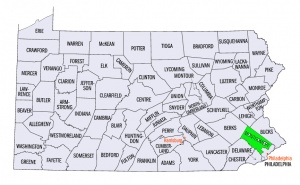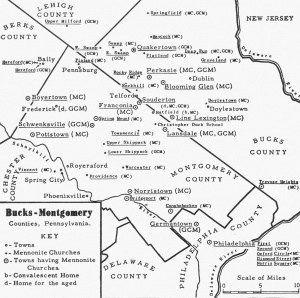Montgomery County (Pennsylvania, USA)
Montgomery County, Pennsylvania, is a heavily populated county in southeastern Pennsylvania in which the Mennonites first settled in 1702 at Skippack, an outpost of the Germantown congregation. Gradually the Skippack settlement expanded, and new settlements were made at Towamencin, Salford, Worcester, Providence, Franconia, and Plains, all by 1740.
The large Souderton congregation was established in 1879, and since 1930 a large number of mission stations, bringing the total 1955 baptized membership of the Franconia Mennonite Conference (MC) congregations and mission stations in Montgomery County to about 2,900. The Oberholtzer division of 1847 resulted in the formation of several new permanent congregations (General Conference Mennonite Church) in the county: Schwenksville (1847), Souderton (1887), and Lansdale (1928), with a combined membership in 1955 of over 1,200.
The Mennonite Brethren in Christ (now Bible Fellowship Church) had only a few congregations in the county: Royersford, Gratarford, Harleysville, and Hatfield, with a total membership of 307 in 1956. The Brethren in Christ had three congregations: Graterford, Souderton, and Stowe, with 175 members in the three churches. Montgomery County was the scene of the Funkite schism of 1778. The Franconia Conference Mennonites have a large home for the aged at Souderton, the Eastern Mennonite Home, built in 1916, and enlarged in 1921. The Eastern District Conference (GCM) has a Home for the Aged at Frederick, established in 1896. The Christopher Dock Mennonite (High) School (MC) was established near Lansdale in 1954. The two most valuable Mennonite historical items in the county are the alms books of the Skippack and Franconia congregations, kept by the deacons since 1738 and 1767 respectively. Montgomery County was the home of the colonial Mennonite writer, Bishop Henrich Funck, of the famous schoolmaster Christopher Dock, and of the Hunsickers, father and son, who founded Freeland Seminary (now Ursinus College) at Collegeville, in 1848. It should also be mentioned that of the congregations of the Franconia Conference only in Skippack was feetwashing observed as a church rite before the 20th century. Both the Skippack congregation of the Franconia Conference, and the (independent) Lower Skippack congregation, still observed the ceremony in the 1950s. From the Skippack congregation the practice gradually spread, mostly since 1900, to the other congregations of the conference. The name "Franconia Conference" derived from the Franconia Meetinghouse in Franconia Township, which was long the chief place of meeting of the ministerial body in conference sessions.
| Author(s) | John C Wenger |
|---|---|
| Date Published | 1957 |
Cite This Article
MLA style
Wenger, John C. "Montgomery County (Pennsylvania, USA)." Global Anabaptist Mennonite Encyclopedia Online. 1957. Web. 1 Apr 2025. https://gameo.org/index.php?title=Montgomery_County_(Pennsylvania,_USA)&oldid=170471.
APA style
Wenger, John C. (1957). Montgomery County (Pennsylvania, USA). Global Anabaptist Mennonite Encyclopedia Online. Retrieved 1 April 2025, from https://gameo.org/index.php?title=Montgomery_County_(Pennsylvania,_USA)&oldid=170471.
Adapted by permission of Herald Press, Harrisonburg, Virginia, from Mennonite Encyclopedia, Vol. 3, p. 746. All rights reserved.
©1996-2025 by the Global Anabaptist Mennonite Encyclopedia Online. All rights reserved.


